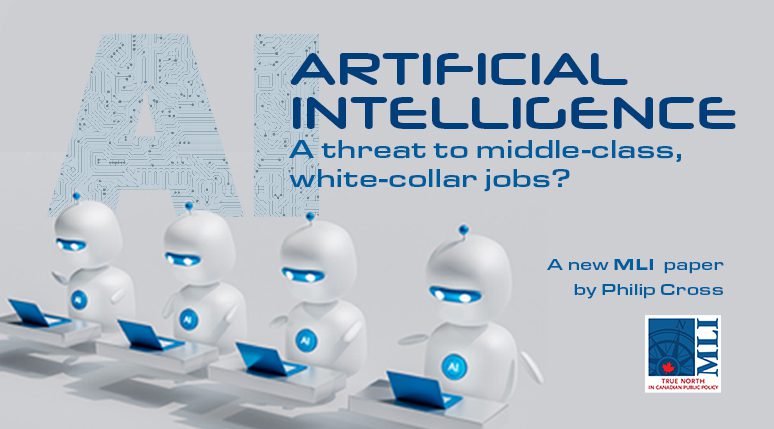Philip Cross

Artificial intelligence (AI) is emerging as the most discussed technological, social, and economic phenomenon of 2023. But many people are concerned that if it proves to be an improvement over human intelligence, AI will significantly reduce the demand for labour, especially for middle-class jobs.
This paper looks at the possible economic impacts of AI. It makes no attempt to forecast how AI will evolve and does not address broader concerns about whether the capabilities of AI will outrun the ability of humans to understand and manage this technology. Rather, it examines the economic impact of AI so far and compares its evolution with past forecasts of how technological change would affect workers. It cautions against a rush to increase government regulations and spending based on as yet unfounded concerns about the impact of AI on jobs.
Machine automation has been feared for its impact on human jobs since the Industrial Revolution began. Earlier eras of automation disrupted employment patterns in farming and factories, but overall job growth actually accelerated as higher incomes drove the expansion of other industries. Despite that experience, there are numerous forecasts that the deployment of AI will lead to widespread job losses.
Compounding the anxiety of potential job losses is the fear that AI will displace middle-class jobs and that the rewards from the widespread deployment of AI will accrue to a small number of people who own the capital and will thereby increase inequality. The reality is that recent developments in the labour market are the exact opposite of these gloomy predictions. Employment rates are at an all-time high. The main difficulty of employers is finding workers in a labour market where unemployment is near historic lows. While AI technology was predicted to be a unique threat to white collar jobs, white collar employment in Canada, the US, and Britain continues to increase steadily. This raises the possibility that AI will be deployed to help workers do their jobs better – not to get rid of employees.
There is a long history of erroneous predictions about new technologies leading to massive job losses for workers. While every recession in the past century has been at least partly blamed on automation, these pessimistic forecasts were all incorrect because of what economists call “the Luddite fallacy,” which ignores the fact that productivity gains from technological innovation always have immediately or eventually generated more income and jobs. Over the last two centuries job losses on farms and factories that resulted from new technologies were balanced by workers upgrading their skills and moving to new occupations where demand was rising due to higher incomes generated by productivity gains. Few of the lost jobs were missed as most of the work replaced during the early Industrial Revolution was repetitive, routine, and often dangerous. While economists and pundits worried for decades that robots and automation would destroy millions of jobs, outside of cyclical recessions employment rates have risen steadily, to record highs.
Much of the difficulty of forecasting the impact of technology on the labour market stems from the challenge of predicting how technology itself will evolve. Overall, AI is likely to make workers more productive and therefore more desirable to employers. Furthermore, the implementation of AI technology is likely to roll out slowly, which will help employers and workers adapt to its use. Past history shows even the most transformative technologies, such as electricity or the internal combustion engine, require decades to be widely diffused. A prolonged period of adaptation seems to be inevitable for AI.
While the potential capabilities of AI are often exaggerated, human abilities are routinely underrated. Humans retain key abilities that machines cannot duplicate or replace. Even in highly technical fields such as machine learning, artificial intelligence, and cloud computing, human beings are underrated. Machines may replace some jobs, but humans are too intelligent, creative, versatile, and adaptable to not find interesting work to do.
No comments:
Post a Comment